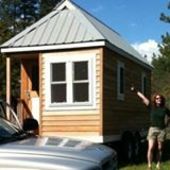With the fall of creative financing and option of home buying becoming less available to a larger piece of our demographic, some people are clinging to the idea of co-housing or shared living communities.
One such community is happing just down the street. The Daybreak Cohousing Community has ‘broken ground' on a new project. When I say broken, I mean dismantled a great set of ‘horse shoe apartments' circa 1943 (that were in decent condition and rather iconic to the neighborhood in my eyes) in preparation for their new fancy building.

Knowing my past experiences with roommates, I'm sure that this would never be my calling. But I am fascinated in the Daybreak community's plight. First off (and perhaps unfairly and incorrectly), I think of people that want to participate in commune-style living to be hippies... suns of the earth... tree huggers... And yet they've taken these perfectly fine buildings and re-purposed them into modern day condo-like hipster housing. (When I use the words ‘dismantle' and ‘re-purpose' I do mean that they are consciously re-using as much of the original structure as possible to build their ideal community).
What made the original apartments so charming was the huge maple tree that sat in the middle of the horse shoe. Other than severely trimming the tree back to make way for construction, they've thus far managed to save it. In fact, it might be bad karma to take the old tree to the ground now after they had their ground-breaking ceremony under the tree and adorned it with Tibetan prayer flags.
I would imagine that this project is created for both social and financial endeavors. To become fulfilled by creating a community within a community while sharing the costs.... And they might save quite a bit of money on this venture. There appear to be 16 families participating in the community and if they keep their building budget under $2,000,000 they stand to save $75,000 to $200,000 on a ‘similar' (a term loosely used under the circumstances) condo. Hey, this could be the new wave. Now reselling their space in the community when they decide to move on might be another story all together.

Comments(7)